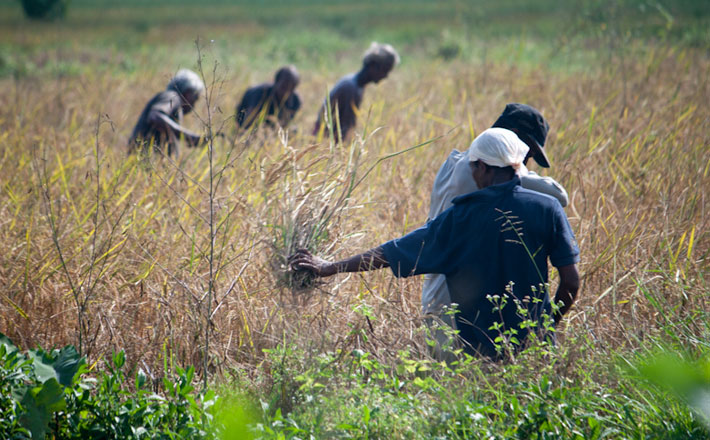Commentary on Exodus 16:2-15
Christians are often eager to follow John’s Gospel in typologically linking the “bread from heaven” of Exodus 16 with the incarnation of Christ and the Eucharistic meal (John 6:30-58). This week’s lectionary pairing moves in another direction.
This week’s lectionary pairing moves in another direction. In the gospel reading for this sixteenth Sunday after Pentecost, we hear no discourse about the “bread of life.” Instead, we are challenged by a parable that defies economic common sense, revealing the economy of God’s kingdom to be one guided by justice, grace, generosity, and the reversal of status hierarchies (Matthew 20:4, 12, 14-16). The pairing of Exodus 16:2-15 with Matthew 20:1-16 similarly challenges us to focus our attention on the social, political, and economic ramifications of liberation and divine generosity in the story of manna and quail in the wilderness.
The story’s social dimension is brought immediately to the fore in the subject of the first verse: “the whole congregation of the children of Israel” (Exodus 16:2). This congregation is first mentioned, four times, in Exodus 12, in the instructions for the first Passover meal (Exodus 12:3, 6, 19, 47). The next cluster of occurrences of the word “congregation” are in Exodus 16:1-17:1, where the word is repeated six times (16:1, 2, 9, 10, 22, 17:1). The word does not appear again in Exodus until 34:31, where it precedes the first public reiteration of the Sinai covenant (34:32). The third and final cluster of references to the “congregation” continues in chapters 35 and 38, with specific reference to Sabbath and the building and furnishing of the tabernacle (35:1, 4, 20, 38:25).
This pattern of clustering highlights three key moments in the constitution of Israel as a people: 1) communal preparation, enactment, and reenactment of God’s plan for liberation from slavery; 2) the provision and gathering of bread and quail in the wilderness; and 3) the gifts of the law and sacred time and the people’s participation in the construction of the sanctuary that would locate worship at the center of their common life.
It seems obvious that the first and third moments constitute Israel as God’s people. How, then, does the provision and gathering of bread and quail in the wilderness similarly shape and define God’s people as “congregation”? The people are shaped as congregation through God’s response to human lack. This responsive gift of provision requires human participation in a labor economy of sufficiency and equality, rather than accumulation and disparity, and establishes a rhythm of life that mirrors creation.
The story begins with a complaint, a death-wish, and a stark assertion of lack (Exodus 16:2-3). The congregation has left the land of Egypt only to find itself in a dry and barren wilderness (16:2). They are united by insecurity, anxiety, and hunger. Their complaint soon emerges as a central motivator in the narrative: four times the congregation is told that God acted because God heard their complaint (16:7, 8, 9, 12).
God’s hearing also motivated God to liberate the Israelites from slavery. The groans and cries of an enslaved people caused God to remember the covenant God had made with their ancestors and to ransom them from their captors (Exodus 2:24, 3:7-8, 6:5-6). God’s hearing contrasts sharply with Pharaoh’s refusal and inability to hear (5:2, 7:4, 13, 16, 22, 8:11, 15, 9:12, 11:19). Hearing demands a response; Pharaoh would not hear so that he would not have to respond. Beneficiaries of political and social systems that are ordered toward the preservation and augmentation of wealth and power for one group at the expense of another are skilled at ignoring the realities they do not wish to acknowledge.
By contrast, God hears and acts. God acknowledges the insecurity and anxiety of the congregation and perceives its connection to their material, embodied needs. God’s response is concrete and “down to earth” and promises to re-form the once-enslaved people in the daily and weekly rhythms of provision, labor, satiety, and rest. These rhythms mirror the poetry of creation found in Genesis 1.
The rhythm of Genesis 1’s creation story is established first and foremost by the six-fold repetition of the phrase “and there was evening and there was morning” followed by the enumeration of days one through six (Genesis 1:5,8,13,19,23,31). The seventh day is set apart not through repetition, but through “ceasing” (2:2), which interrupts the pattern of making or doing with a time of rest from labor. In Exodus 16, the reference to the culmination of labor and a double-portion of bread “on the sixth day” hints at a connection to the creation narrative (Exodus 16:4-5). The subsequent four-fold alternation of evening and morning strengthens this connection as the promise of provision and instructions for the people’s labor are spelled out in further detail (16:6-7, 8, 12, 13).
The congregation will be shaped by the mundane, day-to-day work by which they respond to the divine gift that supplies their lack (16:4). They will be created and re-created in routines of contingency, dependence, trust, and generosity. They are promised that by observing this routine they will come to know God as the one who freed them from slavery and sustained them each day in the wilderness (16:6, 7, 12).
The lection does not tell us how the people respond to this charge. It leaves us instead with their puzzlement and with Moses’ assertion that this thin crust that coats the earth is their bread and a gift from their God (Exodus 16:15). Their response is yet to come, and so is ours.
It is noteworthy that the first issue to arise after the experience of liberation from slavery is the question of how to establish a sustainable economy in a place called wilderness. If you are preparing to preach on this passage, you might discern a connection to the food insecurity that still plagues hundreds of millions throughout the world, or to the modern hoarding of wealth and opportunity by privileged elites that more closely resembles Pharaoh’s economy of slavery than the new wilderness polity.
We can imitate Pharaoh, and refuse to hear, or we can imitate God, and acknowledge and respond to complaints that are borne of hunger, lack, and crippling anxiety. With these realities in view, ask, what are the daily practices and rhythms of life that will ensure food security, fair wages, equal opportunity, and rest for all members of your communities?


September 24, 2017